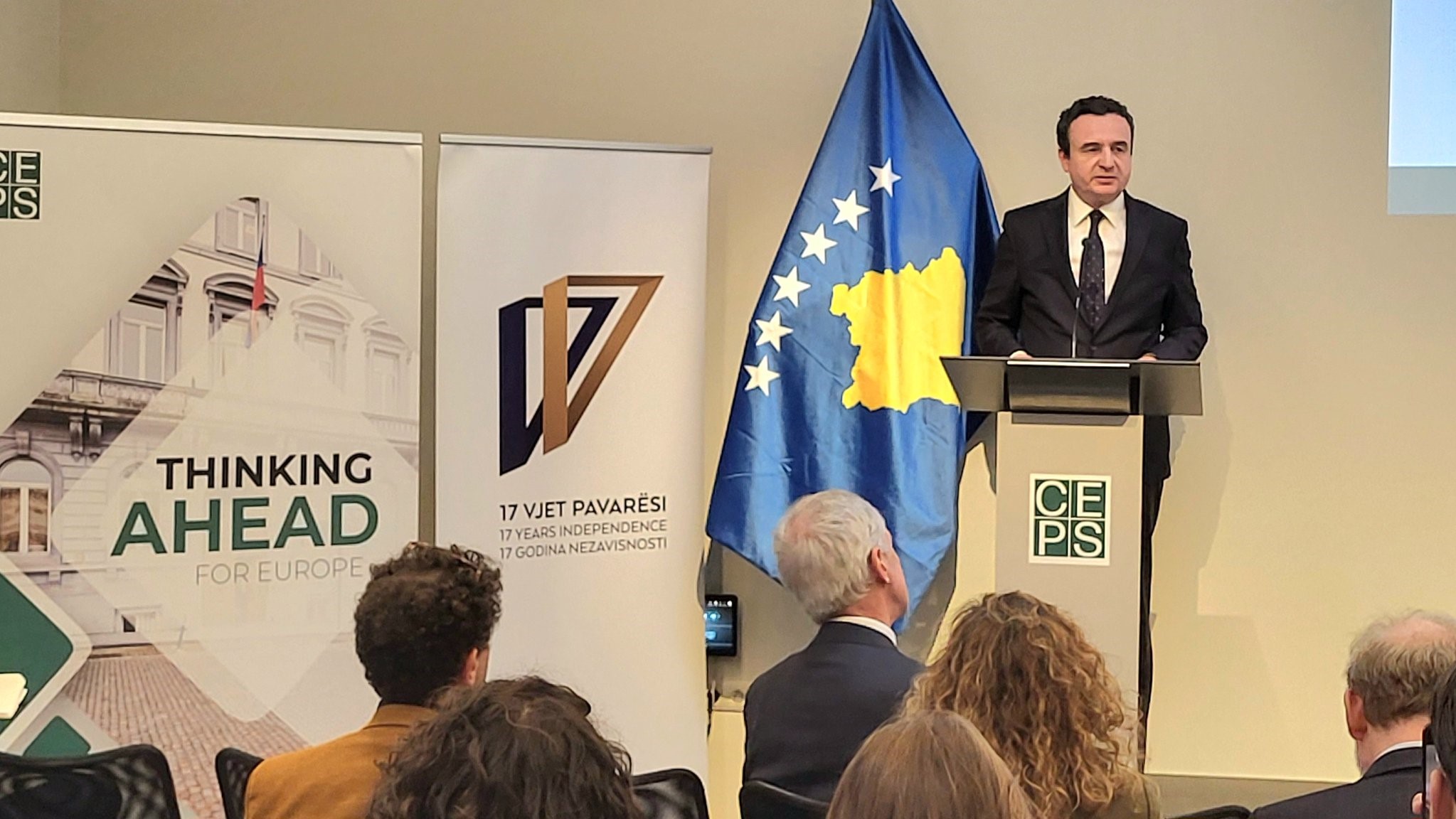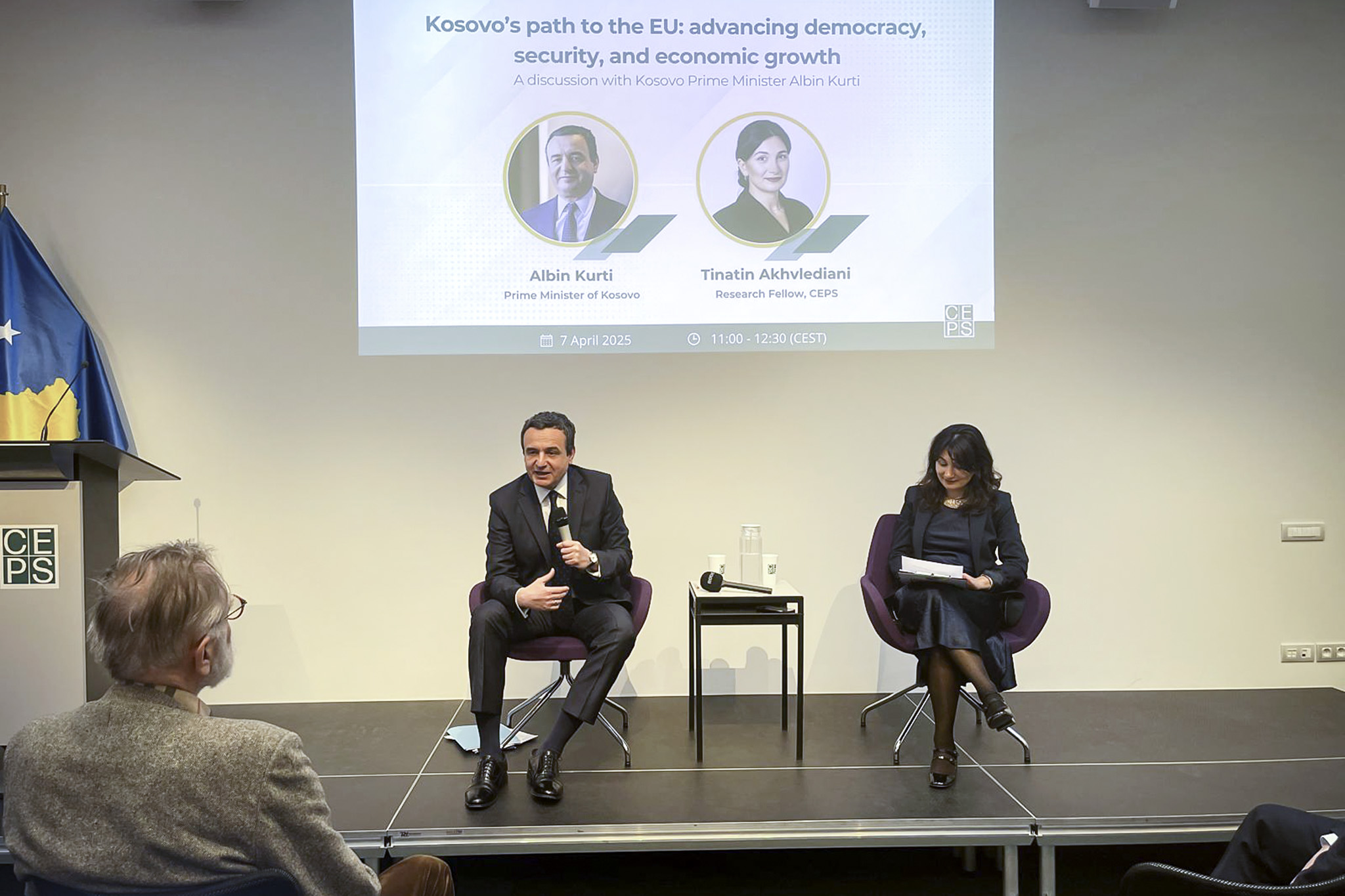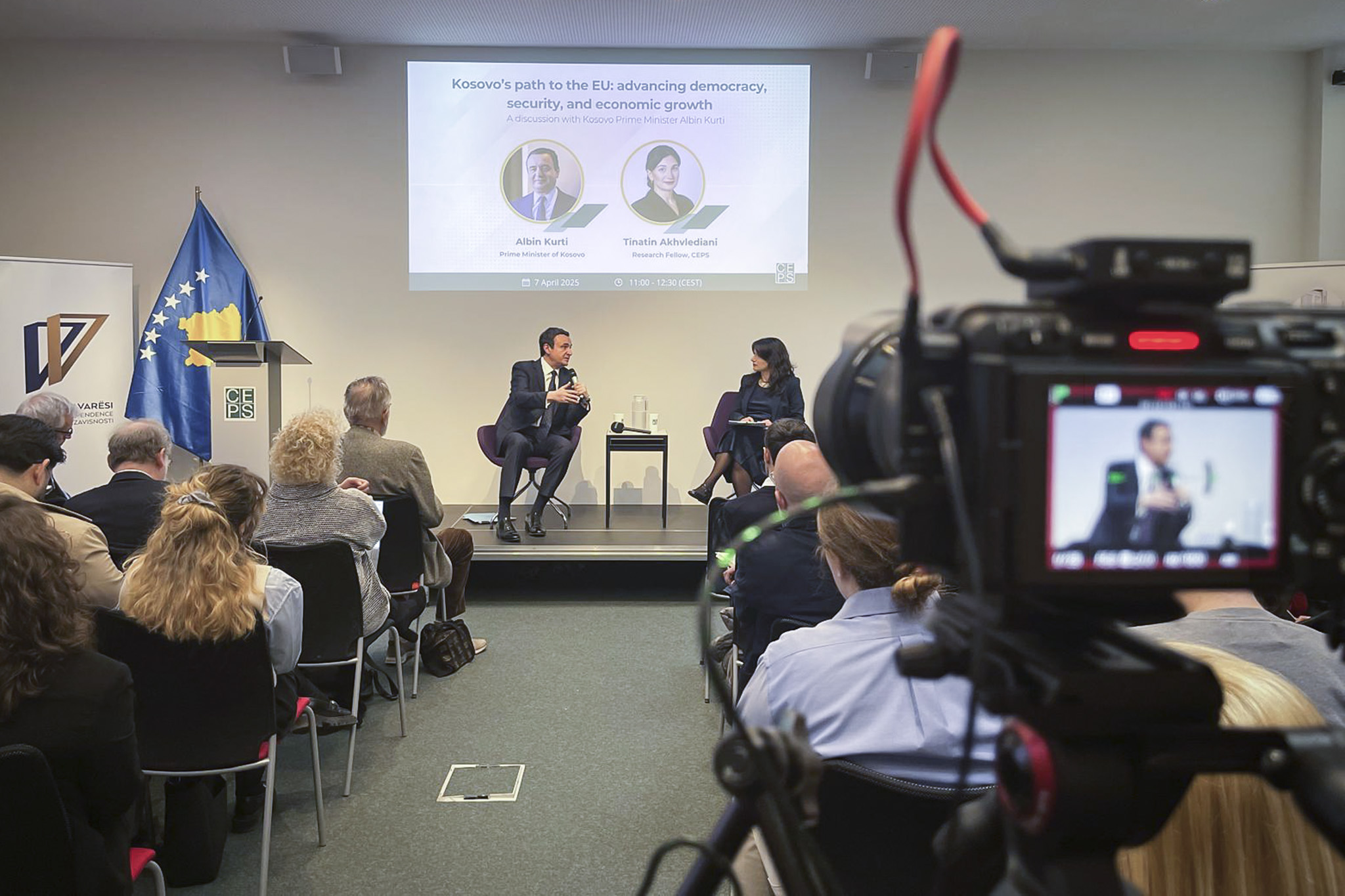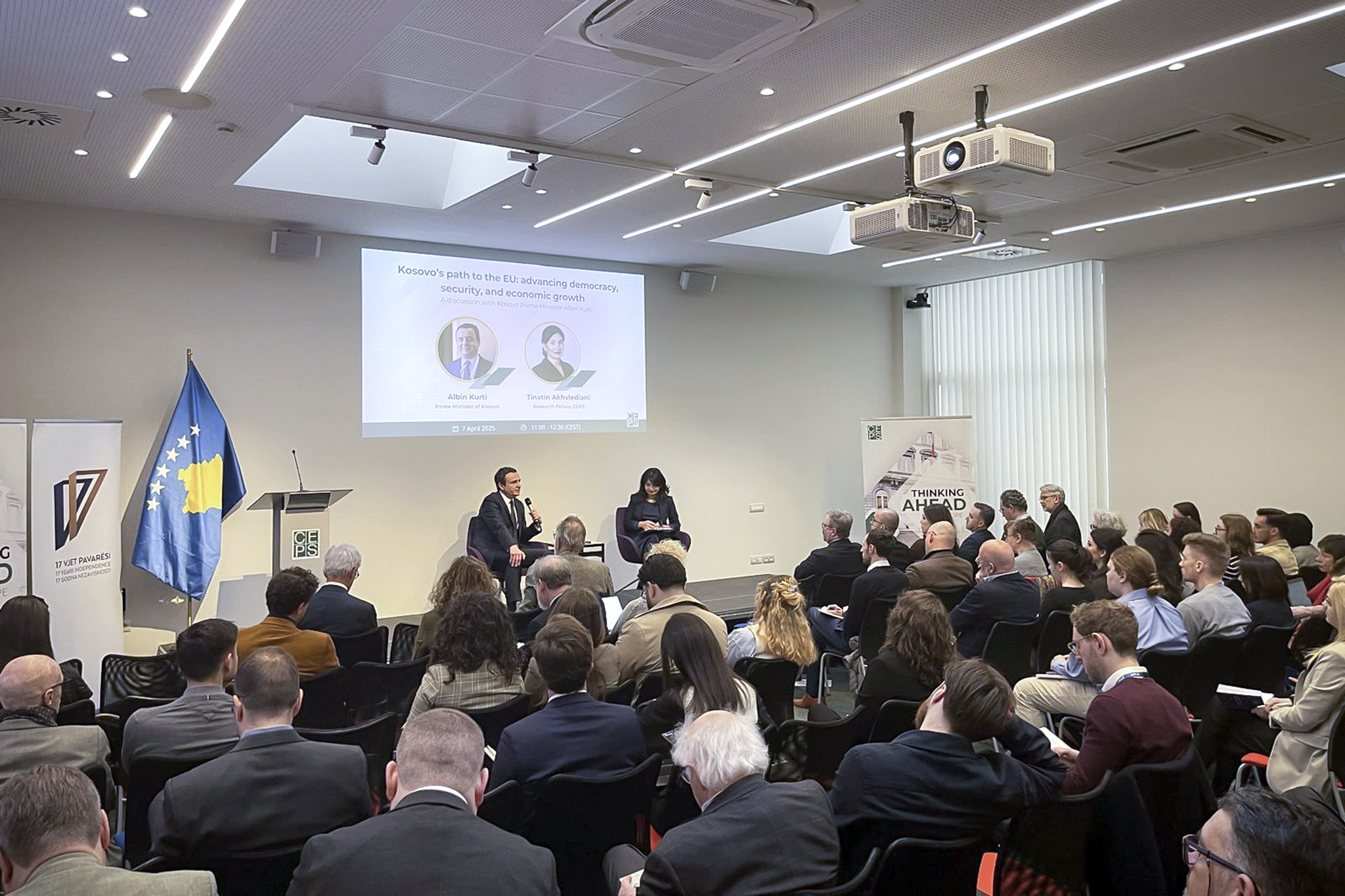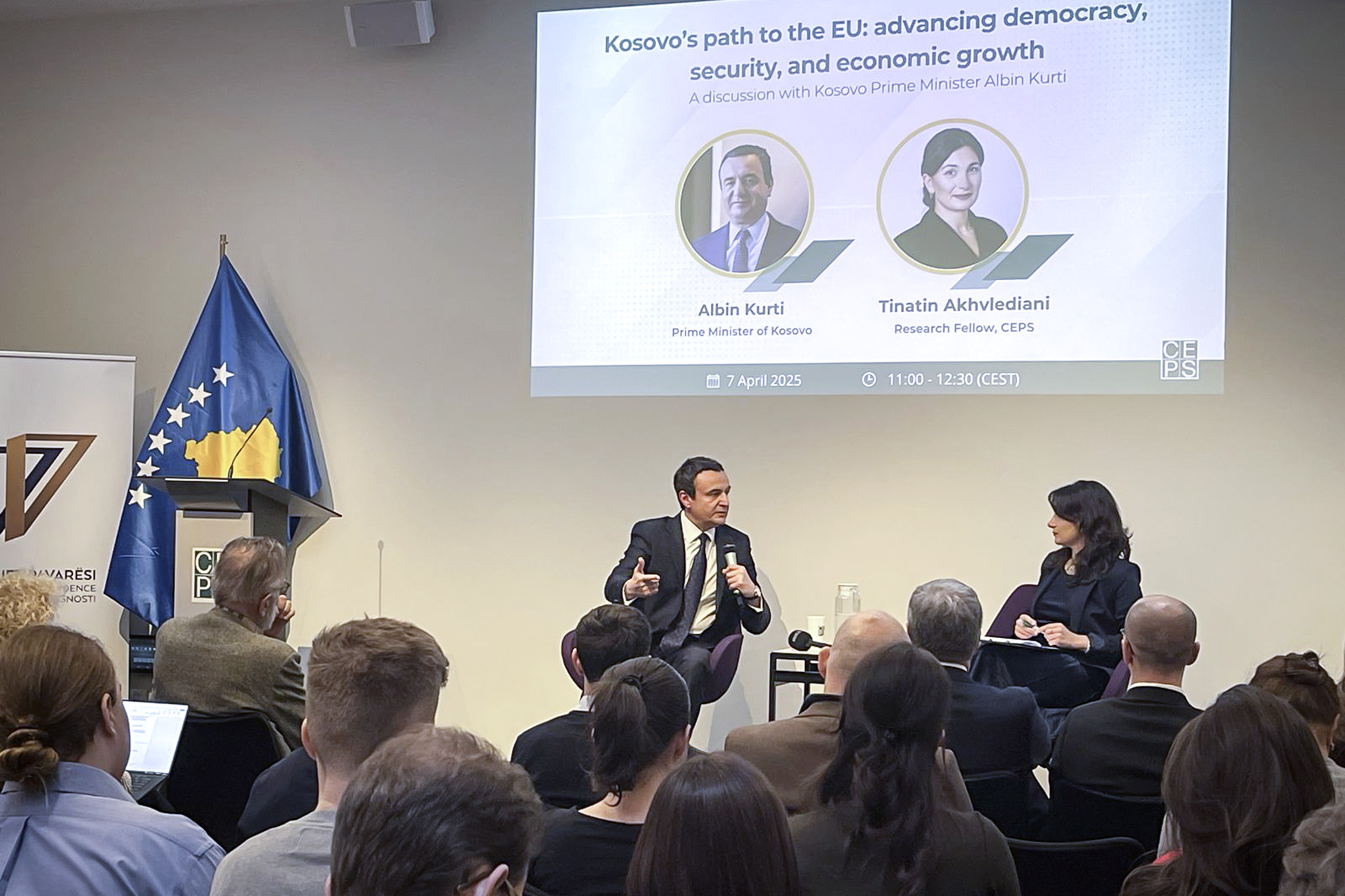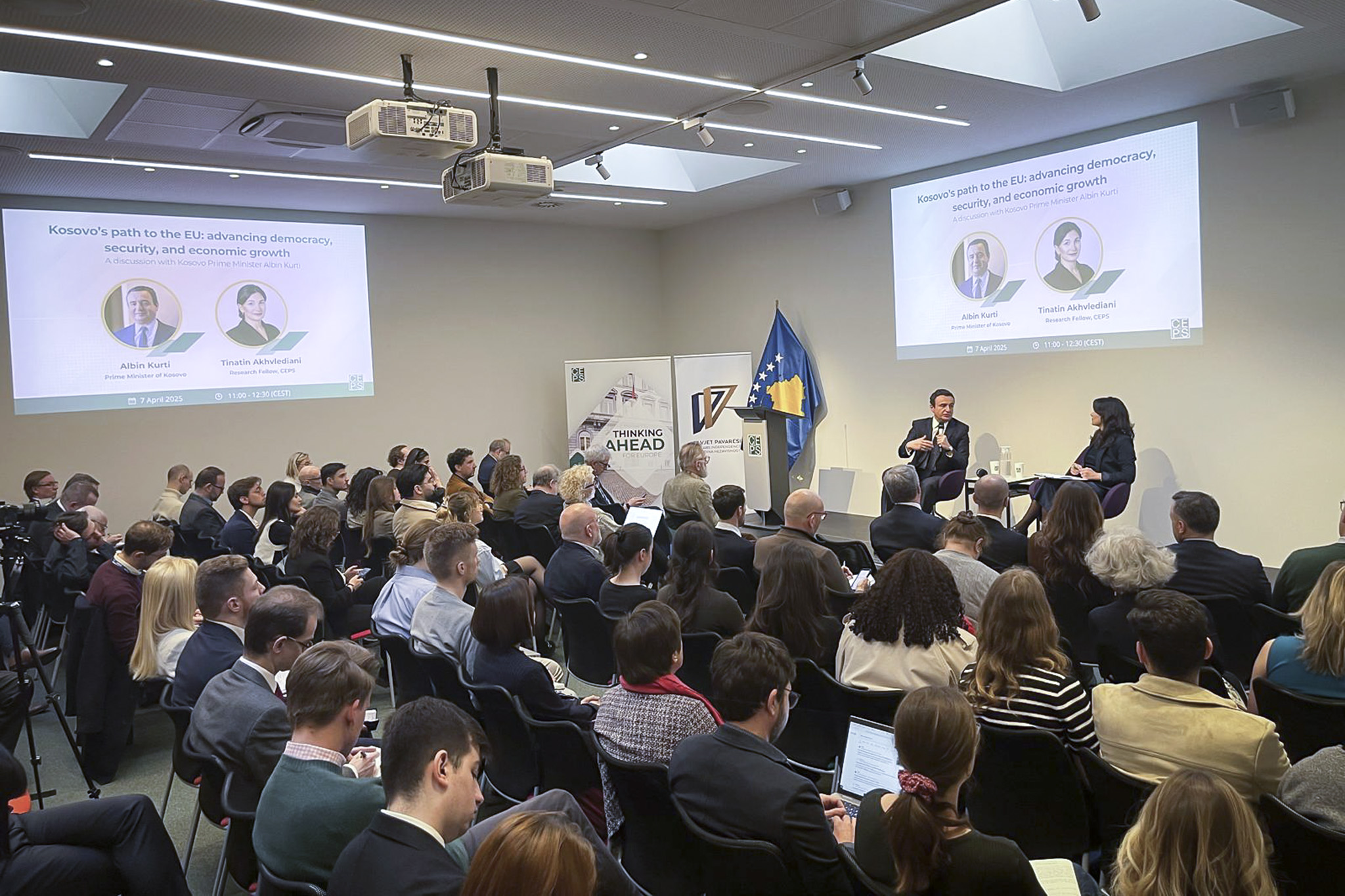Today in Brussels, Prime Minister of the Republic of Kosova, Albin Kurti, participated in discussion organized by the Center for European Policy Studies (CEPS) in cooperation with the Embassy of the Republic of Kosova in Brussels, on the topic “Kosovo’s Path to the EU: Advancing Democracy, Security and Economic Growth”.
Prime Minister’s full keynote speech:
It is both an honor and a responsibility to address you today on an important topic as well as these times which are unprecedented geopolitical security shifts and complex global challenges that we all face together, even though some more than other.
For over two decades, the European Union has consistently affirmed that the Western Balkans belong in the European Union. This commitment was unequivocally articulated at the Thessaloniki Summit of 2003, where the EU pledged its support for our European integration. The commitment was repeated many times through European Council conclusions, every six months. And yet, only Croatia has thus far managed to become a member.
Recently, however, things are looking more hopeful. After ten years of stagnation and little progress, the EU seems to have laid the foundation for a closer relationship, deeper cooperation, and a structured accession path. During the past three years, we have seen concrete progress, including:
· The initiation of accession negotiations with Albania and North Macedonia;
· The granting of candidate status to Bosnia and Herzegovina;
· The EU membership application of Kosova on December 15, 2022, and the approval of visa liberalization for Kosova citizens on January 1, 2024;
· The granting of candidate status to Ukraine, Moldova and Georgia; and
Yet, despite these advancements, the enlargement process remains excessively prolonged, bureaucratic, and unpredictable. It has become a moving target, raising doubts about whether the political will truly exists to integrate the Western Balkans into the European family. A growing sense of disillusionment, particularly among younger generations, threatens the very legitimacy of the EU’s promise. Compounding this uncertainty, the war in Ukraine has fundamentally altered the nature of EU enlargement.
Enlargement, once a technical and political instrument, has now evolved into a geo-strategic and security imperative. While we fully support Ukraine and Moldova’s EU candidacy, this shift must not come at the expense of long-standing candidates who have spent years implementing Stabilization and Associations Agreements, directing EU accession funds to legislative alignment, and fulfilling other technical EU requirements. Enlargement must remain merit-based, with a predictable result: EU membership.
Particularly in the case of Kosova, this has not been the case. Kosova is the most advanced democracy in the Western Balkans and a standard-bearer of EU fundamental values, yet remains only a potential candidate for EU membership.
Nonetheless, our country’s commitment to EU accession, and to its values, policies and standards, is stronger than ever.
Kosova’s strategic goals include joining the EU and NATO. As such, our full alignment with the EU’s Common Foreign and Security Policy (CFSP) is unquestionable, given that our citizens strongly support Kosova’s integration into the EU. The war in Ukraine highlighted the imperative to strengthen unity and solidarity across Europe. The CFSP stands out as a crucial instrument for upholding peace and security within our region and continent alike.
Kosova remains fully aligned with the CSFP and EU values as part of its ongoing reforms. This is evident in our strong condemnation of Russia’s unprovoked war against Ukraine and the adoption of multiple sanction packages against Russia, Belarus, and their allies. Kosova has also provided substantial military aid to Ukraine, including vehicles and mortar rounds. We have also welcomed 18 Ukrainian journalists to Kosova as a part of our Journalists in Residence program, offering them a safe space to continue their important work.
Furthermore, Kosova has a modern and advanced legal framework for the protection of human rights, including minority rights. According to the Council of Europe’s eminent lawyers, it is a framework that exceeds international standards. Kosova grants constitutional status to international human rights instruments such as the Universal Declaration on Human Rights, the European Convention on Human Rights, the Council of Europe Framework Convention on the Protection of National Minorities, and the Council of Europe Convention on Preventing and Combating Violence against Women and Domestic Violence. Kosova’s constitutional order also adheres to the Copenhagen Criteria and principles promoting an open and competitive market economy.
For eight years now, Kosova has consistently shown the political will and capacity to implement its obligations deriving from the Stabilization and Association Agreement (SAA), which has been in force since April 2016. We have substantially improved the quality of policies, thus proving our ability to implement the EU sectorial acquis.
Through the Stabilization and Association Process, for twenty years, Kosova has aligned and approximated its legislation and institutions with EU acquis, norms and standards. For over a decade, the people of Kosova have dreamed of joining the EU—not only because of the promise of prosperity, but because of the values the EU holds, the common interests we share, and our potential to contribute as a member of the European Union.
We have reformed, strengthened, and aligned ourselves with EU standards.
In addition, Kosova has no plan B to EU membership.
Kosova has demonstrated that it is a reliable partner of the European Union and strongly believes in its European future. As an example of democracy in the region, we have shown our commitment when equal chance is given. It is time for the EU to show that it sees Kosova as part of its future. This will strengthen even further our dedication to the European agenda, making the path to the EU more tangible.
The time has come for Kosova and the EU to intensify joint efforts in overcoming obstacles hindering Kosova’s accession process to the EU. Namely:
1. To initiate the Questionnaire for Kosova, assessing our institutional and legal capacities for EU Membership; and
2. To prepare a merit-based opinion for EU candidate status.
Kosova is Europe’s youngest state. In 1999, it emerged from a decade of apartheid, culminating in a brutal war and the last genocide of the 20th century.
Just 26 years later, Kosova is one of the fastest-growing economies in the Western Balkans. Despite global challenges, our economy has been among the top performers in the region over the past three years, as confirmed by World Bank indicators. From 2019, the last pre-pandemic year, to 2024, Kosova’s GDP grew by almost 50%, exports doubled, and foreign direct investment more than doubled. During this period, 24% more jobs were created and formalized, lifting families out of poverty and reducing unemployment from 26% to 11%.
Meanwhile, our progress on democratic indicators over the past four years has been repeatedly confirmed by international observers, in multiple reports issued during this period. For example, Kosova’s global ranking has improved 31 places in Transparency International’s Corruption Perceptions Index, in which we achieved our highest ever score in 2024. A Freedom House report ranked us first in the Western Balkans, second in Europe, and third in the world for the largest improvement in political rights and civil liberties. And a report of the World Justice Project placed Kosova second in the world for greatest progress in rule of law. We are also first in the Western Balkans, and among the top nine countries in the world in terms of democratic progress, according to the V-Dem Institute’s Electoral Democracy Index.
This tremendous democratic progress was most recently demonstrated in our first regular parliamentary elections since the founding of our state. On February 9, 2025, we organized these elections based on a new law that reflected OSCE/ODIHR recommendations, marking significant progress in addressing the EU Election Observation Mission’s (EU EOM) long-standing recommendations. The adoption of a consensual law on general elections provided a solid foundation for democratic elections in line with international standards.
Thus, at a time when many democracies around the world have faced democratic erosion, Kosova continues to make progress as the most democratic country in the region. These achievements highlight Kosova’s democratic resilience as a partner and its dedication to EU values.
The European Commission has also recognized Kosova’s improved coordination and implementation capacities in the European Union integration process. Over the past four years, we have successfully addressed numerous long-delayed reforms related to the EU acquis, which have been consistently recommended by the EU for a decade now.
In the Commission’s most recent report on Kosova, issued in October 2024, it found that we had demonstrated progress in 36 out of 38 areas, and regress in none.
Key areas of improvement include:
• Good progress in customs, taxes, social policies, education, culture, and energy;
• Alignment with the internal market, with 16 laws and 35 bylaws approved under the SAA;
• Successful formalization of jobs;
• Significant reduction in public debt;
• Improved public project management;
• Growth in exports and increased economic openness;
• An increase in new businesses, with over 1,140 opened only in 2023;
• A stable financial sector;
• A better business environment and successful digital transformation; and
• A decrease in unemployment to a record low of 11%.
The EC 2024 annual report also praises developments in the regional cooperation agenda, particularly Kosova’s representation in CEFTA and progress in building the Regional Common Market (RCM), one of the greatest achievements of the Berlin Process. Kosova’s commitment to operationalizing this market and its proactive approach have helped overcome previous challenges and created new momentum in this process, which is now included as the second pillar of the Growth Plan.
During the Berlin Process on October 14, 2024, I announced that our country would unilaterally lift visa requirements for citizens of Bosnia and Herzegovina starting in early 2025, urging reciprocity. In December, the Government formally adopted this decision, allowing ID cardholders from Bosnia and Herzegovina to enter Kosova without a visa starting from January 1, 2025.
This decision reflects Kosova’s commitment to ensuring that the Berlin Process benefits citizens directly while fostering regional stability and collaboration. It is also part of Kosova’s ongoing efforts to be an active and constructive contributor to regional cooperation and European integration.
In addition, Kosova welcomes and is fully committed to the new Reform and Growth Facility for the Western Balkans. It is encouraging to have in place a Growth Plan that aims to improve convergence within the WB6 and with the EU through boosting economic integration, moving closer to the EU Single Market, strengthening regional cooperation, and accelerating fundamental reforms.
Kosova was the first country in the Western Balkans to deliver the Reform Agenda to the European Union on time, demonstrating its state capacity to implement necessary reforms. This agenda foresees 111 reform steps in priority areas, including: governance, public administration, green and digital transitions, private sector development, human capital retention, and the rule of law.
Apart from Kosova’s own outstanding progress on EU values and reforms, the entire region also needs a roadmap to Full Membership.
Gradual integration offers a structured and incremental approach to aligning the Western Balkans with the EU, but it must not become a substitute for full accession. There is already a declining confidence among the public in the EU enlargement process, according to the RCC barometer. Support for EU membership has fallen to 54%, reflecting disillusionment over the slowness of the accession process. This signals that while the European aspiration endures, its credibility is at risk. Tangible progress must translate into visible and measurable outcomes among citizens and businesses so as to maintain the public trust.
Ladies and gentlemen,
The integration of the Western Balkans into the European Union is not merely a political aspiration — it is a strategic necessity. Our country’s steadfast commitment, and our citizens’ strong support for integration and partnership with the EU, will contribute to the acceleration of EU-related reforms.
The will of the people — at least for most of the countries in WB6 — is clear, and so is the EU’s vision for the Western Balkans: the future of the region lies within the European Union.
The Western Balkans stand ready and committed to playing a constructive role within the European Union. Now, the European Union must act decisively, move beyond bureaucracy, and uphold its commitments.
It must counter Russia’s destabilizing influence, and accelerate the accession processes for EU aspirants.
The time is now to reinvigorate the process to be more strategic and merit-based, to reward commitment and reform, and to embrace the countries that contribute to the shared vision of a united Europe. Let us advance together—step by step, reform by reform—until Kosova and the rest of the Western Balkans take our rightful place in the European Union.
Thank you very much.

